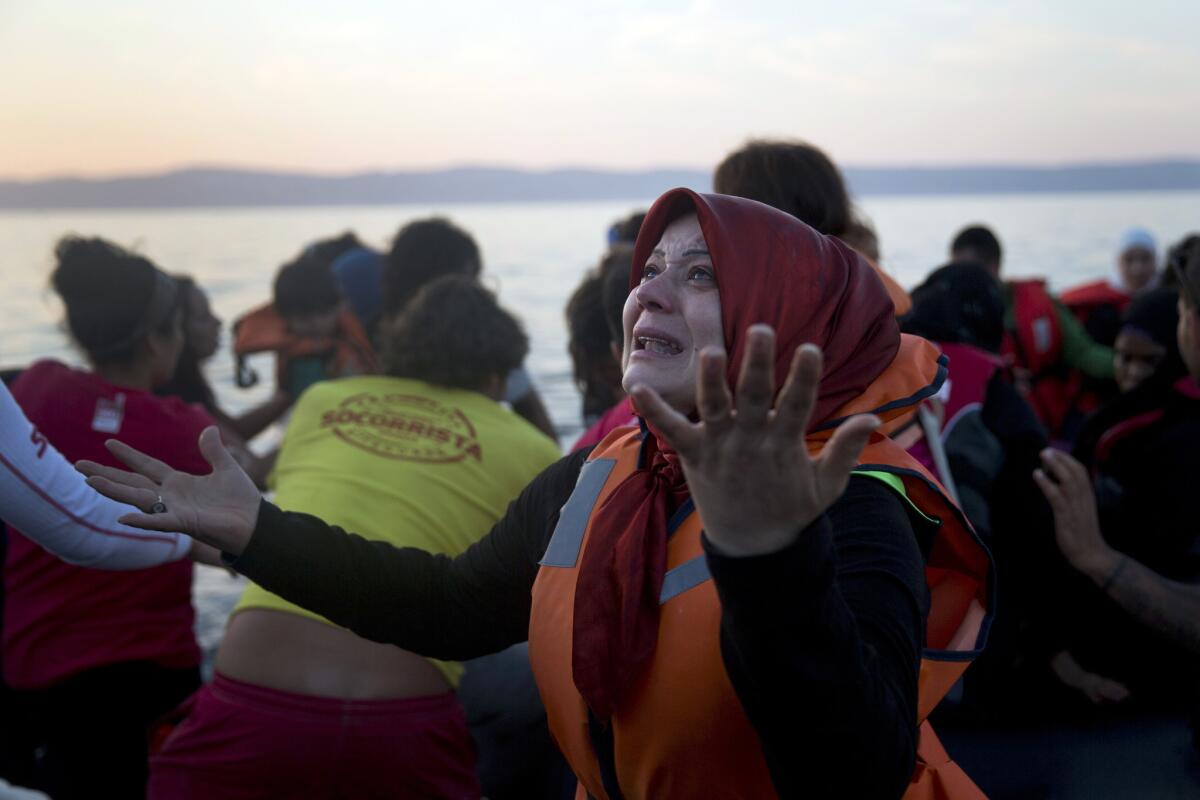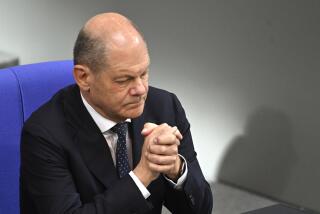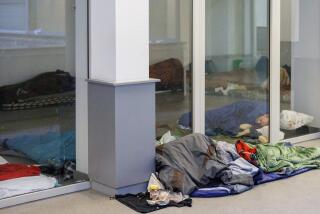‘A beacon of hope’: Kerry says U.S. will take in more refugees

A Syrian woman reacts as she arrives at the island of Lesbos, Greece, after crossing from Turkey aboard a dinghy.
reporting from Berlin — Secretary of State John F. Kerry pledged Sunday that the United States would increase the number of refugees it accepts to 100,000 in 2017 — a substantial increase, although only about an eighth of the number Germany expects to take in this year.
“This step is in keeping with America’s best tradition as a land of second chances and a beacon of hope,” Kerry said during a visit to the German capital.
The mainly symbolic show of American solidarity in the face of Europe’s crisis came as tragedy and hardship struck the southern and northern ends of a much-traveled asylum seekers’ trail Sunday. More than two dozen people were reported missing after a boat carrying refugees and migrants capsized off Greece. And Austria, at Germany’s doorstep, was left staggering by the arrivals of about 15,000 people over the weekend.
Greek coast guard vessels hurried to the scene of the latest sinking, off the eastern island of Lesbos, which has been a prime transit point for those beginning an arduous journey to Northern and Western Europe. Many make the risky crossing in frail and unseaworthy rubber rafts.
News agencies said that the boat had apparently carried 46 people, and that 20 were rescued, with 26 missing.
Hundreds of miles to the north, angry recriminations continued among relatively poor Eastern European nations that have been buffeted by the tens of thousands of people streaming through — or trying to do so. Desperate scenes have become common at border crossings turned choke points, with whole families sleeping out in the open during increasingly chilly nights or pleading to be allowed to board trains or buses, or proceed on foot.
Hungary, which has taken by far the hardest line against asylum seekers, pushed ahead with an expansion of its border fence, the first stretch of which was built to keep migrants from crossing into its territory from its southern neighbor, Serbia. Hungary is now constructing barriers on its frontiers with Romania and Croatia, drawing sharp protests from both.
------------
FOR THE RECORD
Sept. 20, 9:50 a.m.: An earlier version of this article said Syria was Hungary’s southern neighbor. Actually, Serbia is directly south of Hungary.
------------
Slovenia, inundated by arrivals from Croatia to the south, said Prime Minister Miro Cerar spoke by phone with German Chancellor Angela Merkel and appealed for guidelines to be agreed upon at a series of European Union meetings this week.
Despite being passed off from one gateway country to another, record numbers of migrants and refugees are managing to reach Austria. APA, Austria’s news agency, reported that at least 15,000 people were thought to have entered the country over the weekend.
German authorities said hundreds of those went on to Germany — the desired destination for most — aboard special trains.
The new U.S. acceptance pledges announced in Berlin by Kerry, while welcomed by European officials, were dwarfed by the numbers of those arriving on Europe’s shores. The United States currently caps the number of refugee visas at 70,000. Under the new plan, that would rise to 85,000 next year and 100,000 in 2017, with the possibility of more being taken in once proper security mechanisms were in place.
Kerry also promised stepped-up humanitarian aid.
Almost half a million people, many fleeing war and persecution, have crossed the Mediterranean this year seeking haven in Europe. Syrians and Afghans make up the largest share.
Germany, the top destination, is expected to take in about 800,000 people this year.
Merkel says Europe is morally obliged to accept those entitled to asylum under international law, and has appealed — so far with little success — for other members of the EU to step up and accept a fair share of the arrivals.
In addition to quarreling over the notion of mandatory quotas, European officials acknowledge that the chaotic mass movement of hundreds of thousands of people, and both EU and non-EU countries’ uneven response to it, has undermined the passport-free travel zone that had been one of the union’s signature achievements.
Times staff writer Paul Richter in Washington contributed to this report.
Follow @LauraKingLAT on Twitter.
More to Read
Sign up for Essential California
The most important California stories and recommendations in your inbox every morning.
You may occasionally receive promotional content from the Los Angeles Times.










